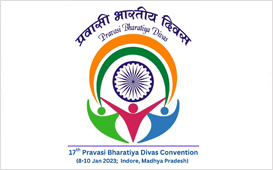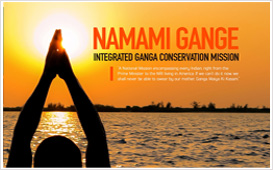My ministerial colleague Shri Narendra Singh Ji Tomar,
Ministers of state Meenakshi Lekhi Ji, Shobha Karandlaje ji,
Secretaries Dammu Ravi, Sanjay Verma, Manoj Ahuja Ji,
Excellencies, Officials, Friends
It's really a very great pleasure to welcome you all here today, and I think, to the Ambassadors present, I would say, I gave you a heads up by sending you a hamper made out of millets for Diwali this year. So you should have known what was coming thereafter.
Now, we're all gathered here, really to understand and appreciate and take forward the International Year of Millets in 2023. This was a resolution which, as you heard was moved in the United Nations a year ago, at the initiative of India, but with the support of 72 other countries many of whom are represented here today in the room, and it is an initiative, which again, as the film and the presentation highlighted, an initiative that is very much part of the vision and agenda of Prime Minister Narendra Modi. Now where millets are concerned, it's often regarded as an ancient grain. It has a history, which predates the more modern cereals that we consume. And in fact, millets were found in the Indus Valley, in some of the artefacts which were recovered from the Indus Valley Civilization, and where India is concerned, we are the world's largest producers, about 17 million tonnes I think, that's roughly about 20% of the global production. But we are part of a global production. About 130 nations out of almost 200 produce millets in some form or the other. And we ourselves produce nine kinds of millets, I understand that different countries have their own varieties in that regard. Till now, from the other speakers, you have heard about the food security aspect of millet production, you have heard about how, from the perspective of climate, their lower carbon footprint, their lower water usage, why greater production of millet is useful. You've heard, especially from the Secretary, about the wellness and nutrition aspects of millets. So you have probably asked yourself, what more could a Foreign Minister add to this? And I would like you to think about millets from the point of view of international relations and diplomacy.
You know, international relations probably if you look, why do countries have relations with each other, what is the starting point of international relations? I think it is a safe bet to say that it started with food security. That when you had collectives, territorial collectives, who wanted to deal with other collectives, their fundamental urge was really to secure their own food, and to see if they could get food from others. And see how this could be traded for mutual benefit. So, I would like you, today, to look at this entire subject, both from the point of view of food security, and from the point of view of it being a global enterprise. That it is something which no country can do by itself, effectively, impactfully. And it is something where the world would be better off if we did it more collectively and that is one of the reasons why we were so keen that to take what was an Indian year of millets into the world as an international year of millets.
Look at the state today of the world. And again, I would like you to reflect on the relevance of millets to that. If there are three big challenges which we have experienced and continue to experience, they are, to my mind the three Cs: COVID, conflict, and climate. And each one of them, in some way, has actually impacted food security.
We saw during COVID, for example, that if you had very concentrated centres of production, and something happened, because they got disrupted, then the entire global economy was at risk because there were problems in one particular geography. Now, this wasn't just in the case of China and manufacturing. I can share my own experience that when we had a lockdown in 2020, probably some of the countries who were most concerned were our immediate neighbours, and countries of the Gulf, because countries of the Gulf were importing food from us on a daily basis. And we actually even in the middle of the lockdown assured them and delivered on that assurance that we would keep the food supply chain going. So there were actually periods where the only planes which were actually taking off from some of our airports were actually planes to the Gulf, carrying food supplies. So the COVID was a period which reminded us what a pandemic could do to food security. And think about it, this was not the first pandemic, it surely will not be the last pandemic. This pandemic could have been even worse and if there are future pandemics, how do we prepare for the food security implication of pandemics.
Or let me ask you to turn your attention to conflict. One of the biggest concerns which has arisen from the Ukraine conflict was the inability of two major food producers. Ukraine was by far, the leading exporter of wheat. What happens when food exporting nations for some reason, in this case, conflict, what happens if that gets disrupted? And we saw all immediately how the conflict led to escalating food prices; led to speculation; led to shortages. So, again if you have concentrated centres of food production and food export, and we are utterly and totally dependent on that for the stability of global markets, what happens if something goes wrong there. And now again, like pandemics, we know that we would hope that this conflict comes to an early end! That, there are no more. But I think all of us who work in international relations plan for the fact that worst case scenarios can happen.
And look at the third C, climate. I think by now, anybody with common sense would agree that we are seeing more and more of extreme climate. And extreme climate, in fact, is a double whammy. It can lower production and it can disrupt trade. So, if you put therefore, COVID, conflict and climate together, I would suggest that perhaps in international relations, we should all be giving much greater attention to food security.
When it comes to food security, what is it we are looking for? We're looking for the same as we're looking for other parts of security. We are looking for more sources; we are looking for more diversity; we are looking for more production; we are looking for more reliable and resilient supply chains. And if there is today, a concentrated global push of millets, millets which, again, I remind you are grown by 130 countries around the world. What you will see is, these 130 countries will surely enhance their own self-reliance and food security. But, in the process, they will actually contribute to a larger amount of food grains, which would be available for global consumption. So, do think of this not purely as a nutritional exercise or agricultural exercise or something which will improve farmers’ incomes- all of which are extremely important, but do also reflect on the larger implication of greater production of a more diverse food, of food which has so many other virtues, which the other speakers have brought out.
So as we look at the world today, I think de-risking the global economy requires more decentralized production. It requires more self-reliance; it requires certainly a willingness on the part of countries to not only do more for themselves, but to help each other out. And that is the message of the International Year of Millets. That is why we would like all of you, in your respective countries, really to absorb and transmit this message that in this International Year of Millets, we would like to take it forward as a truly global partnership. We would like to certainly propagate the consumption of millets. We would like to encourage the production of millets. We would like even the countries who may not directly be consuming or producing them, really to look at it as part of a larger global food security scenario.
So once again, I really thank you all for joining us today. Since they say that the proof of the pudding is in the eating. In this case, I think that proof will be given in the lunch today.
Thank you very much.


































